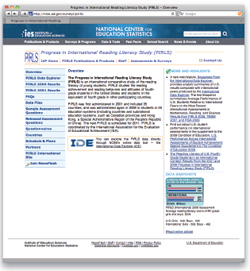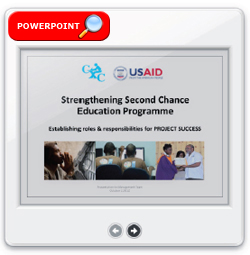![]()
![]()
![]()
During the year, 2012, Corporate Strategy and Business Development (CSBD) continued to pursue new business opportunities geared towards meeting organisational objectives through the forging of strategic alliances with CXC stakeholders.
The implementation of initiatives and/or projects to support CXC’s core functions and products also continued. The major initiatives were in the areas of publishing, online learning, language learning, fundraising, revisions to The Agreement Establishing the Council, and intellectual property management.
Fundraising
Proposals seeking assistance for funding to implement and/or to support various programmes were submitted to funding agencies and other corporate bodies as outlined below.
Strengthening Second Chance Education ProgrammeA proposal was submitted to, and accepted by USAID for financial assistance to support Second Chance Education. The aim of the project is to build a sustainable infrastructure that would allow at-risk youths of all interests and abilities to access programmes that may lead to the development of valuable life skills, training/retraining for the world of work, portable certification, and a continuing education platform for future development. To ensure the success of this programme, three broad objectives will be pursued. These are: building strategic alliances/learning partnerships with public, private and non-profit organisations; taking steps to build a quality management culture and environment; and expanding access to technology in education to facilitate e-learning. The required work plan was submitted to USAID in November and funds to cover staffing, sensitization and needs analysis to enable commencement of the project were disbursed. |
|
Progress in International Reading Literacy (PIRLS) Study ProjectA proposal for technical cooperation and funding was submitted to, and accepted by the Inter-American Development Bank (IDB) to support the Caribbean region’s participation in the Progress in International Reading Literacy Study (PIRLS) programme, an international student performance benchmarking assessment. PIRLS will provide internationally comparative data on how well children from the region read after four years of primary schooling as compared to their counterparts in the rest of the world. Additionally, given that high-quality internationally comparative data about student reading achievement are important for monitoring and improving the health of a country’s education system, PIRLS will enable evidence-based decisions to support educational reform. Grant funding in the amount of US$100,000 was received from the Government of Barbados through the Inter-American Development Bank (IDB) to enable registration of the Caribbean as a single entity. This funding will also allow CXC Participating Territories to receive individual reports that will provide comparisons of the performance of their students with that of children of similar ages in the rest of the world. Nine territories – Anguilla, Belize, Cayman Islands, Jamaica, Montserrat, St Kitts and Nevis, St Lucia, St Vincent and the Grenadines, and Trinidad and Tobago have confirmed their participation in the project. CXC is the coordinating centre with responsibility for advising, organising and managing regional participation. The project commenced during the last quarter of 2012 with the pilot phase, during which country coordinators were trained at workshops conducted in collaboration with the International Association for the Evaluation of Educational Achievement and IDB. |
 |
The Agreement Establishing the CouncilRevisions to The Agreement Establishing the Council which will modernise the Agreement and allow for easier accession of new members continued throughout 2012. In addition to seeking feedback from Ministries of Education of the CXC Participating Territories, during the second and third quarters of the year, two meetings were held with Attorneys General of these territories and CXC’s legal counsel, in an effort to advance the process. The process will continue in 2013 and on completion, the Revised Agreement Establishing the Council will be consistent with international treaty law and practice and will also address CXC’s present and future needs. Intellectual PropertyMonitoring the use of CXC’s intellectual property (IP) for infringements continued in 2012 and appropriate actions were taken with the assistance of legal counsel as necessary to control infringements. Up to the end of 2012, one case involving compensation to CXC was being handled by legal counsel and all cease and desist requests were adhered to without challenge. There were no noticeable increases in copyright violations or unauthorised and/or improper use of CXC’s trademarks. Guidance continued to be sought by, and advice appropriately provided to, third parties on the use CXC’s IP. Additionally, to further protect CXC’s IP rights, registration of all CXC trademarks was undertaken in Guyana. Monitoring will continue during the upcoming year to ensure continued protection of CXC’s IP rights. |
 |


